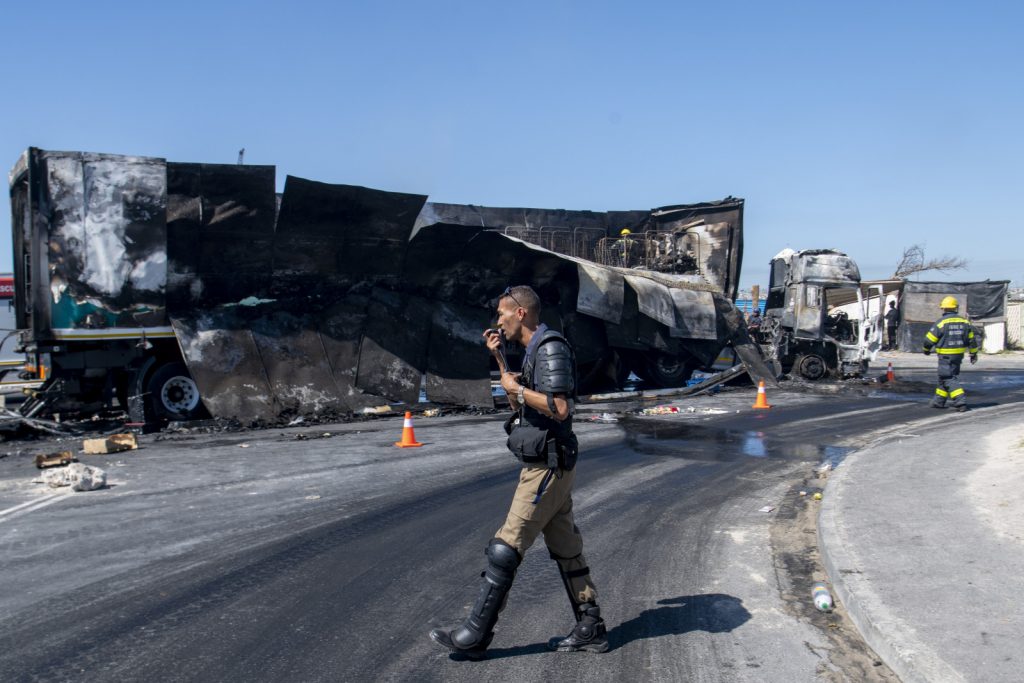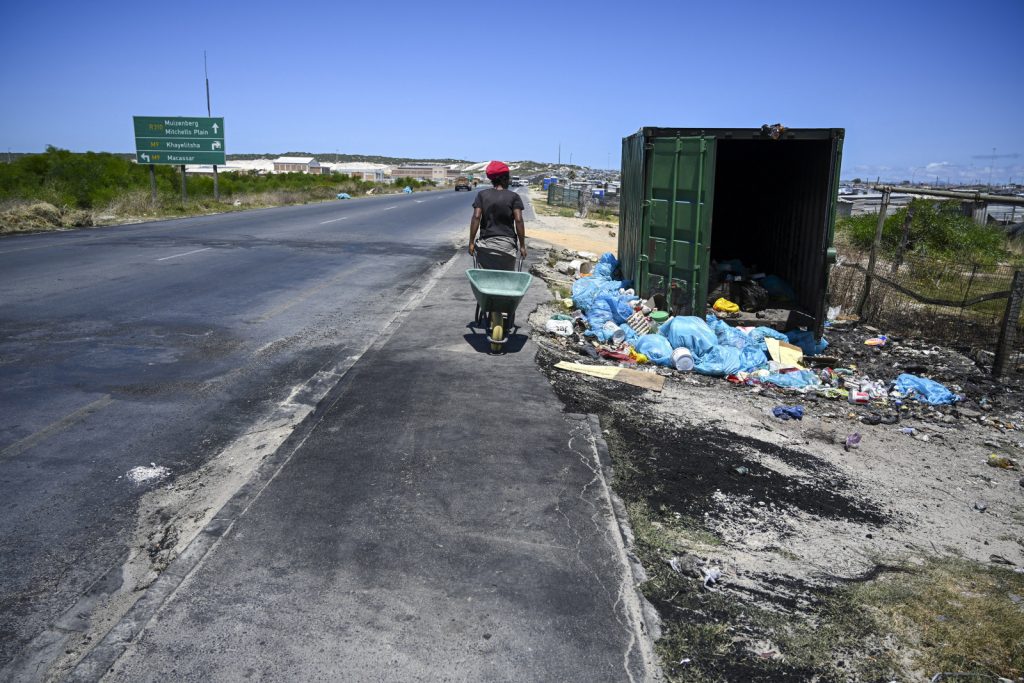Grievances: Service delivery protests in areas such as Khayelitsha have become ‘a firmly entrenched social phenomenon’, with at least 193 occuring in 2022. Photos: Jaco Marais & David Harrison
The community of Ethembeni informal settlement in Khayelitsha, Cape Town, is determined to prevent history repeating itself when residents’ homes were flooded with a combination of sewage and water during winter rains in July 2021.
Ever since then, residents have been protesting, demanding sewerage infrastructure, proper toilets, water, electricity and homes, “not shacks”, community leader Mxolisi Sila told the Mail & Guardian.
“They keep on promising; they have made promises since 1994.”
Despite numerous protests, the four-year-old Ethembeni community and its challenges have not been recognised by any political party, according to Sila.
This has not been a deterrent, with the residents taking matters into their own hands. They have dug deep ditches around the vast area of land that was flooded and filled with sewage in 2021. This, according to another community leader, Alex Madikane, will keep the water and sewage from entering their homes, come winter.
“We are not waiting for government; it won’t flood again,” said Madikane. He pointed out another area covered with heaps of old cement blocks and sand, where an early-childhood development centre was being built.
Down the road from Ethembeni is another informal settlement known as The Island. Protests in this community caused temporary road closures on Monday morning. The exact motive for the demonstrations remains unclear but, according to residents, included issues ranging from a lack of electricity services to workers for the City of Cape Town protesting that their six-month contracts had not been renewed.
Service delivery protests in South Africa have become a “regularly occurring and firmly entrenched social phenomenon”, according to Kevin Allan, managing director of Municipal IQ, a specialised local government data and intelligence organisation that collects information on service delivery demonstrations.
According to Municipal IQ, service delivery protests are back to pre-Covid-19 levels, with 193 recorded nationwide last year.
“This high annual rate (of 193) may not have been at previous record levels — like in 2018 and 2019 — but it was significantly higher than any other previous year,” said Allan.
In 2018 and 2019, protests totalled 237 and 218, respectively.
The South African Police Service (SAPS) was present at 2 455 protests from July to September last year, according to their quarterly crime statistics released in November.
While the police recorded a significantly higher number of protests than Municipal IQ, all types of crowd management incidents are captured by SAPS, not only service delivery protests.
“All protests are recorded on the incident registration information system by the public order police commanders in provinces. These are the recorded protests that are reported and attended to by the SAPS,” Brigadier Athlenda Mathe, national spokesperson for South African Police Service, told the M&G.

Citing their data, Allan points out that protests are no longer once-off or sparked by an unusual or rarely occurring event. Protests have become the “go-to” option for communities to raise grievances.
“One of the biggest takeaways from protests in 2022 is that, going forward, protests will probably average at a higher annual rate than in most previous years,” said Allan, adding that last year’s data showed electricity was the biggest cause and driver of service delivery protests.
He said: “National government must intervene in the electricity fiasco and its local manifestations, specifically to provide leadership on issues regarding the non-payment of municipal electricity debts to Eskom, the non-payment of electricity bills by municipal users and the resultant cut-offs by Eskom and the frustration this causes.”
South Africa is facing the most severe rolling blackouts since they started in 2007. The country was plunged into stage six load-shedding three times last month. Stage six was first announced on 10 January, again on 11 January and most recently on 31 January, according to the load shedding app EskomSePush.
The persistent levels of high load-shedding prompted the opposition Democratic Alliance to lead a protest to the ANC’s Johannesburg headquarters Luthuli House on 25 January, under the slogan Power to the People.
National spokesperson for the DA Cilliers Brink told the M&G people are angry because of “sitting in the dark and the damage rolling blackouts are doing to the economy”.

“The march on Luthuli House directed that anger at the source of the problem — ANC cadre deployment and state capture led to the breakdown of Eskom and the country’s electricity generating capacity. And, today, the ANC’s recalcitrance stands in the way of a solution to the energy crisis.”
According to Brink, an estimated 3 500 people joined the march. The number excludes participants in the Cape Town march. He said the march was “peaceful, orderly and held in good spirit”.
“When the DA marches, people don’t close their businesses or fear that their streets will be trashed. They set up stalls to sell refreshments and regalia. That’s one other contribution we are proud to make to South Africa’s protest culture.”
Violent protests are common in South Africa.
During the high number of protests in 2018 and 2019, SAPS noted in its 2018-19 annual report: “Political, economic, socioeconomic and/or domestic instability is a serious challenge … Issues that contribute to instability are violent industrial and service delivery-related protest actions … It is, therefore, imperative to prevent and combat the violent crime that accompanies legitimate industrial protest action.”
Police and intelligence services were criticised for their inadequate response to the violent unrest in July 2021, where widespread looting and riots took place in KwaZulu-Natal and, to a lesser extent, Gauteng.
The riots, sparked by the jailing of former president Jacob Zuma, left 354 people dead, thousands injured and led to over R70 billion in losses to private sector businesses alone in eThekwini, according to that city’s business chamber.
Aside from being politically motivated, the unrest was fuelled by socioeconomic challenges such as unemployment and poverty.
In its response to the Tembisa protests last year, during which four people died, Municipal IQ said protest activities continue as “nothing fundamental has changed in protest-prone communities”.
With little to no change in basic service delivery in volatile communities, protests are likely to continue.
Allan said according to data, service delivery protests “have become increasingly more violent and destructive over a number of years.
“The risk to public and private property, as well as the lives of protesting community members, has increased significantly.
“Unfortunately, it’s become quite clear the more vociferous and violent a service delivery protest is, the more publicity and media coverage it gains. And, at that point, there is a growing possibility local, provincial and national government will step in to try and defuse the situation.”
In its forecast for this year, Municipal IQ anticipates that regular service delivery protests will continue, with heightened frustration caused by load-shedding.
The Ethembeni community was set for two protests during the first weeks of this month.
On 8 February, the community will demand greater action against the City of Cape Town’s anti-land invasion unit, which evicted a naked Bulelani Qolani from his shack in 2020. They plan to hand over a memorandum, rejecting the R150 000 compensation offered to Qolani.
“The punishment is not enough,” said Madikane. “It means they will continue with their inhumane action during evicting people.”On 9 February, the community is due to return to Cape Town to lead a “peaceful” march ahead of President Cyril Ramaphosa’s State of the Nation address that evening.
[/membership]